The Exodus of Zhu Ji Lane
Introduction
There is a small town called Zhuji Lane about 9 km north the city of Nanxiong (Map 1 and Appendix)
which are both under the administration of Shaoguan Municipality, Guangdong Province. The small town has
a very long history. Its name was first used in AD 825 in the Tang dynasty and Zhuji Lane probably
became a town in the late Qing dynasty.
The lane was thought to be a part of an adjacent town called Sha-Shui Town. It was the first stop
south of the MeiGuan (Plum Tree Pass) Post Road of the old Silk Route. The 1,500m long and
3m wide lane are paved with cobbles. On each side there are numerous restaurants, taverns and
markets which had been established to cater to traders and travellers in the past. Based on
historians' researches, over one thousand of visitors had past through the lane everyday for
centuries. Together with the pass and the nearby towns and cities, Zhuji Lane had played an
important role in the link between the economies of the Central Plains and the coastal areas.
Whenever in the turmoils in the central plains, tens of thousands called Nanxiong their home
before they migrated further south. An estimate of 30 millions of Cantonese in Guangdong and
overseas could trace an ancestral footprint in Nanxiong. Occasionally, some of residents in
Nanxiong had migrated back north to Provinces such as Sichuan.
According to a local folktale, there was a mass migration associated with a romantic and sad story.
The story has several different versions, but essentially the exodus was caused by a beautiful
imperial concubine. When the Mongols were sweeping over Asia and when scores of cities were ruined
and tens of thousands perished overnight, China was administered by the corrupt and disloyal officials
of the Southern Song Court. The concubine (or her brother) was said to have offended
the Song's prime minister in about 1272. The concubine escaped from the palace and hid in the village
of Zhuji Lane. After her whereabouts was discovered, the Song's Court was angry and planned to kill
the whole population of Zhuji Lane. Upon the impending massacre, the entire residents of
Nanxiong fled to the Guangzhou Canton) to the Pearl River Delta.
A version from a classic Cantonese opera is included here. The opera might have probably first
preformed in the Qing dynasty, although it could have been preceded by street performances and
story telling in the Mongol's Yuan dynasty. The discrepancies of the opera and the history are
large but the touching details of are still useful to understand the exodus in the tumultuous 13th
Century.
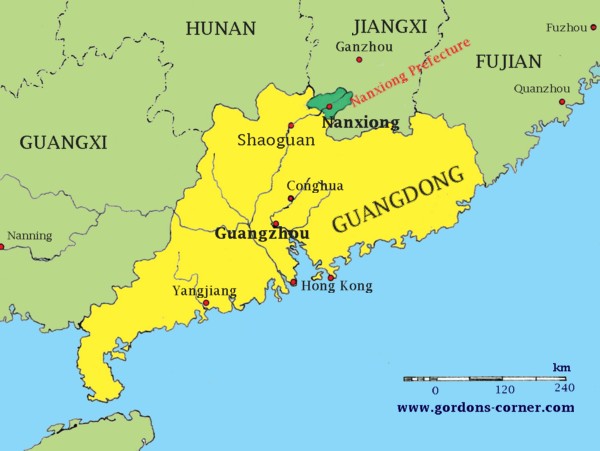
Map 1 — Guangdong Province
The Classic Opera
In the Xian Zhun years (AD 1264-1274) of Southern Song dynasty, the emperor spotted a
beautiful girl at an outing. The girl called Wu Ju-Zhen was summoned to go into the palace and
thus became a concubine. At that time, a northern city Xiangyang was besieged by
the Mongols and the news was held back by the Prime Minister Jia Sidao.
After Ju-Zhen inadvertently told the emperor about the grave conditions of Xiangyang,
Jia Sidao was angry about the leak of the "military secret" and demanded the emperor
to punish the woman.
The emperor was obliged to exile his favourite concubine to a convent just outside the palace.
So, the innocent Ju-Zhen tearfully bid farewell to the weak emperor, but the domineering
Jia Sidao began to worry about her come-back and regaining the favour of emperor.
He ordered his men to burn down the convent so that the concubine would die without a trace.
She luckily escaped from the fire, but by daybreak she could not find a shelter.
Jia Sidao's men found out her escape and were anxious to look for her around the city.
Sadly abandoned to her fate, she jumped into the river to drown herself.
Two merchants, Wang Zhu-man and Liu Zhuang, came to the capital to buy goods and
incidentally witnessed the suicide. When Ju-Zhen was drowning, the older Liu pulled
her from the river. After having recovered consciousness, she did not dare to tell them
of her real name and instead made up a story. The two merchants felt pity for this
homeless woman and offered her shelter in their cargo ship. At dawn, they sailed together
to the traders' hometown in Zhuji Lane of Nanxiong County.
Besides beautiful and intelligent, Ju-Zhen (now called herself GuiZhi) was a capable
woman and skilful in sewing and horticulture. She was adored by Wang and his mother.
After several months, with the encouragement of Wang's mother Liu became the matchmaker
for Wang and Ju-Zhen.
Meanwhile, General Zhang was given the responsibility to investigate the disappearance
of the concubine. He was pressured by Jia Sidao to find her whereabouts and he had sent
out official posters of the wanted concubine throughout the realm of the dynasty.
The poster promised a big reward of her information and also warned of severe
punishments for keeping the information.
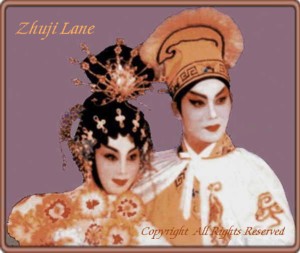 When the rowdy and greedy soldiers came to question the villagers
about the concubine, she confessed to Wang's mother. The mother was indignant
at the corrupt and incompetent Song's court. Thinking that her small village
had stood against all turmoils for centuries, she thus asked Ju-Zhen to stay.
She also approved the marriage of Wang and Ju-Zhen. The family just hoped that
they could keep her background secret.
When the rowdy and greedy soldiers came to question the villagers
about the concubine, she confessed to Wang's mother. The mother was indignant
at the corrupt and incompetent Song's court. Thinking that her small village
had stood against all turmoils for centuries, she thus asked Ju-Zhen to stay.
She also approved the marriage of Wang and Ju-Zhen. The family just hoped that
they could keep her background secret.
One day, Liu saw a want-poster on which the picture resembled closely Ju-Zhen.
He then got the confirmation of his suspicion from Wang's mother. As struck by this discovery,
he travelled all the way from Nanxiong to the capital to turn himself in, being the matchmaker
of this forbidden marriage.
Lady Wu and Master Wang4
Actually after months, General Zhang had given up to find the concubine and had submitted a report
of the drowning of the concubine to the prime minister. When he heard of her new information,
he was afraid of being reprimanded by Jia Sidao for the mistake. He was compelled to kill
Liu. Moreover, he also decided to kill the whole village of Zhuji Lane to keep this secret.
He thus made up a report of an uprising in Nanxiong and asked for a campaign to suppress the local rebellion.
When Liu did not return from the capital, Ju-Zhen went to see the village elder and
told him the truth. He advised Ju-Zhen to go home and keep quiet until he discussed with the others.
Just before her husband, the elder received an urgent letter from his friend in the capital.
His friend was an official in the ministry of defence and found out the
planned massacre of General Zhang. He warned of the impending disaster and
told the whole village to leave as soon as possible. When Wang and the others came,
the elder showed them the letter. They decided to flee together and also
told the other villages to move and stay away from the trouble.
When the escape route was blocked by soldiers, the villagers returned north
and hid in the mountain. They came up of another plan to use the route along
the Zhen River and started to build rafts of bamboo. In the wilderness,
Ju-Zhen did not bear the sufferings of her loved ones and the friendly villagers.
She sneaked out and returned to the village to sacrifice herself. Under a heavy rain,
she met Wang in the village, who also returned to find her. Upon the shouts of soldiers,
she locked Wang in an empty house and confronted General Zhang and his soldiers.
After denouncing them, Ju-Zhen suddenly jumped into a well nearby. When Wang
witnessed this happening, he broke through the door to run stopping her. The Wang
grieved his new wife so much that he also committed suicide by banging his head against
the well. As soon as this happened, a roaring thunderstorm with accusing voices frightened
away the general and his soldiers.
At the last scene, the spirits of the couple in love rose to the top of a cloud and
appeared to the Wang's family and the other villagers.
[Top |Bottom]
The Actual History
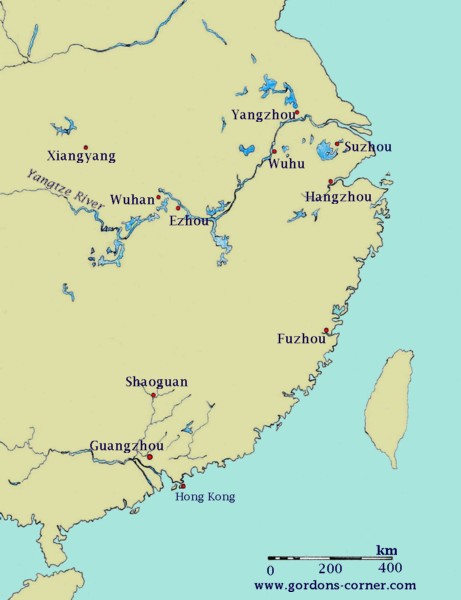
This local tale of Nanxiong could originate from actual happenings of Prime
Minister Jia Sidao. He was the brother of an imperial consort and formed a powerful
circle in the Song's Court. When the Mongols invaded, he led the reinforcement to Ezhou
and successfully held off the invasion [Map 2]. However, he also tried to negotiate a
treaty with Kublai Khan with a promised tribute of silver and silk and a new border
as Yangtse River the boundary.5 Fortunately for the Song Court, one of Sidao's
generals scored the unexpected victory against the Mongols at the western front
in Sichuan Province. The defending commander of Hezhou, Wang Jian, not only
held off the attack but also killed the Great Khan Mengke. At the news of Mengke's death,
Kublai khan suddenly retreated and rushed north. At this opportunity, Jia Sidao
re-occupied more territories in Sichuan and also took the credit of the victory from
Wang Jian. Later, Jia Sidao became the prime minister in 1259. The jealous Jia
Sidao was actually a capable administrator. He adopted the proposal to reform the
regulations for goods and lands and raised more revenue for the poor Song's Court in 1263.6
After Kublai Khan became the Great Khan, he invaded again about 1268. He encircled
the key city of Xiangyang in Hubei Province about 780 km from Hangzhou, the Song's capital.
Jia Sidao had sent several relief forces to Xiangyang.
Map 2 - Southern Song Dynasty
One army of 50,000 carried grain supply on 3,000 ships and sailed against the current from Wuhan, Hubei, to Xiangyang.
Unfortunately all these forces were defeated 5. Finally, a volunteer army of 3,000
led by two General Zhang's came to relieve Xiangyang. One general died and the other
broke through the siege, but he had to break out to rendezvous with another relief column.
Jia Sidao had shielded Emperor Duzong from the grave news of Xiangyang.
A palace woman inadvertently leaked the situation of siege was immediately
executed by Jia Sidao.3, 7
In 1273, the Mongols employed a big cannon against Xiangyang. Under its thundering bombardment,
the frightened Song's commander finally surrendered the city to the Mongols 5.
Emperor Duzong died in 1274 and his son was enthroned. In 1275, the Mongols sailed eastward
along the Yangtze River and one prefecture after one another fell. The dowager empress and the
child emperor had to rely on Jia Sidao, who was asked to lead the defending forces.
He again tried to ask for peace which was flatly refused by Marshal Bayan. The Song's
forces disintegrated without a fight at Lugang in Anhui Province, about 200 km from the capital.
After the battle, Jia Sidao was demoted and banished to the Province of Fujian. En route,
Jia Sidao was killed by the official escorting him to his new post.
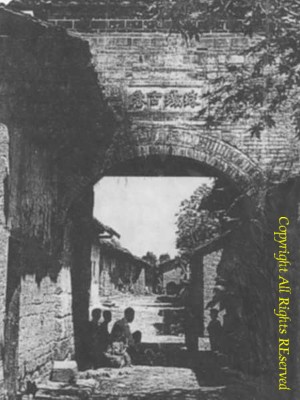 In 1276, the Mongol captured Song's capital at Linan; the Song emperor and the dowager
empress were captured and brought back to Beijing, the new capital of the Mongols3, 6,7, 9.
There are many reasons of the conquest of the highly civilized Southern Song Dynasty
by the Mongols. However, the Confucian scholars despised the opportunistic vile character
of Jia Sidao., who was described as the anti-hero in the history.
In 1276, the Mongol captured Song's capital at Linan; the Song emperor and the dowager
empress were captured and brought back to Beijing, the new capital of the Mongols3, 6,7, 9.
There are many reasons of the conquest of the highly civilized Southern Song Dynasty
by the Mongols. However, the Confucian scholars despised the opportunistic vile character
of Jia Sidao., who was described as the anti-hero in the history.
After the Mongol's expansion in western-south China and the fall of Xiangyang,
the refugee waves brought the population of Zhuji Lane to a high peak. Then,
when the Mongols rolled from the north, the residents and the scared newcomers
started to move south to the coastal areas. The biggest mass migration in the
history of Nanxiong was brought by the Mongol invasion into the territory of Guangdong
Province. The entire population of Nanxiong, including the Zhuji Lane, floated
on bamboo rafts and disembarked between the city of Qingyuan and the Sanshui district1.
Town Gate of Zhuji Lane
Date unknown1
[Top|Bottom]
The Closing Remarks
In history, there were three mass migration in Nanxiong — the ends of Song, Yuan and Ming dynasties. The largest migration was at the end of Southern Song dynasty. According to popular beliefs, the exodus of Zhuji Lane was caused by a fictitious concubine; however, such person is not referenced in official manuscripts. Many poems and essays were still written of this tragedy, and the local villagers had even erected a stone monument to commemorate the heroine. Nonetheless, this story could reflect the sentiments of the thousands of helpless refugees in Guangdong because of the corrupt and incompetent officials and the cruel unreasonable invaders.
Notes
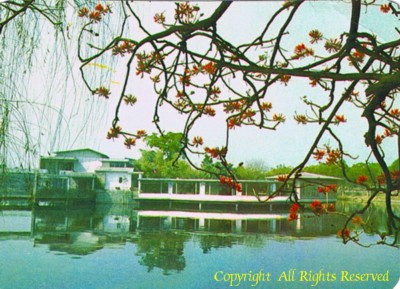 1. The migration of the writer's ancestor
1. The migration of the writer's ancestorThe writer's ancestors were original from the old Longxi Prefecture in northwestern China. They had already settled at the Zhuji Lane and in Nanxiong Prefecture by the time of this mass migration in 1270's. When the Mongols came, the writer's ancestor brought the whole household first to a small city Conghua, just north of Guangdzhou. Then the family clan moved to Guangzhou and settled in the Ban-Tang (Pond Shore) district which had known as the Lychee Prefecture in older times, The district is located at the east of the Lychee Pond in the west of Guangzhou city. The family clan had lived in that district for over 700 hundred years until the end of 1990s.
Restaurant by the Lychee Pond Park (Post card, 1970s-'80s)
At the end of Qing Dynasty, the ancestral hall of the Li's clan was one of the three
biggest clan halls in Guangzhou. The clan consisted of several hundreds of Li's family
in the beginning of 20th Century. The writer is the 28th generation of the family,
with the ancestor migrated from Nanxiong as the first generation.
Every year at the Qing Ming Festival in April, the Li's clan assembled at the tomb
of ancestor at three o'clock. After paying tribute, the clan held an outdoor banquet
for the all members. The expenses were covered by the revenue of the hall.
Every three years, the representatives of the clan travelled to pay tribute at
the tombs at Conghua,. Every five years, the representative of the Li's clan
met with the other representatives of other Li's clans and paid tribute to the
ancestral tombs in Nanxiong. These traditions were suspended in 1938 during the
occupation of Japanese and they were abolished by the government of the People's
Republic just after 1949. The properties of the clan including the hall and the
common fields were all confiscated. The courtyards of the hall were demolished and
only the main building remained standing. The site of the hall was incorporated into
the bounds of the Lichee Pond Park at the westnorthern portion of the park.
2. The Other Version of the Folklore1,2,8
In the reign of the Song Emperor Duzong (AD 1265-1275), a wealthy trader came to
Hangzhou, the Song's capital, to exchange goods. By chance, he met a very
beautiful girl. He took her to his home located at the Zhuji Lane of the Prefecture
of Nanxiong, not realizing she was a concubine of the Song's emperor.
The concubine had been banished to the Cold Palace for disfavoured queens and concubines.
Because of the desolate life, she escaped from the palace. The emperor was angry and had
issued an edict for her arrest After some time the concubine settled in Nanxiong,
some one found her secret and reported to the authority in the capital.
When the emperor judged that the villagers of Zhuji Lane were all guilty of harbouring
a fugitive. He decided to send an army to kill the entire village on the pretext of
suppressing rebellious bandits. An elder of the village had a son-of-law, who was
an official in the capital. Upon hearing of the impending disaster, the official
immediately sent a confidential message to warn the elder and asked the villagers
to flee as soon as possible form Nanxiong. The magistrate of Nanxiong approved the permission
requested by the villagers to move elsewhere because of disturbance by bandits.
When the imperial troops arrived in Nanxiong, the whole area were deserted except
for a few houses lived by the families of officials. In the end, the imperial commissioner,
who led the troops, did not decide to pursue the escapees and returned to the capital.
In the legend, the concubine had already drowned herself in a well so as not
to involve the innocents.
References
[1] Li, Ping Liang (Peter), "Li's Genealogy Book," hand written in 1945 and updated in later years to 1990, unpublished.‡[2] Poy, Vivienne, "A River Named Lee, Calyan Publishing Ltd.," Scarborough, Ontario, Canada, 1995
[3] Xu Hinye, "The Ancient History of China I & II," The Shanghai Education Press, Shanghai, China, 1964.‡
[4] "The Lingering Spirits of the Zhuji Lane," VCD, Guangdong Cantonese Opera Theatre Company/Regiment One.‡
[5] "The Twenty-Five Books of History," Jinlin Photocopying Press.‡
[6] Chinese History, www.sanbeck.org/AB3-chin.html by Sanderson Beck
[7] Khubilai Kan and Yuan Dynasty — www.orbat.com/site/history/china/news/html
[8] Siyi Genealogy, www.legacy1.net by Keven Lee
[9] Zeng, Cheng, "The Old Zhuji Lane," The People's Government of the City of NanXiong, www.gdnx.gov.cn ‡
[10] Yuan Dynasty, Song Dynasty, www.chinakowledge.de by Ulrich Theobald.
‡ in Chinese
Appendix — Translation of names of people and places
[Top|Middle] of Page